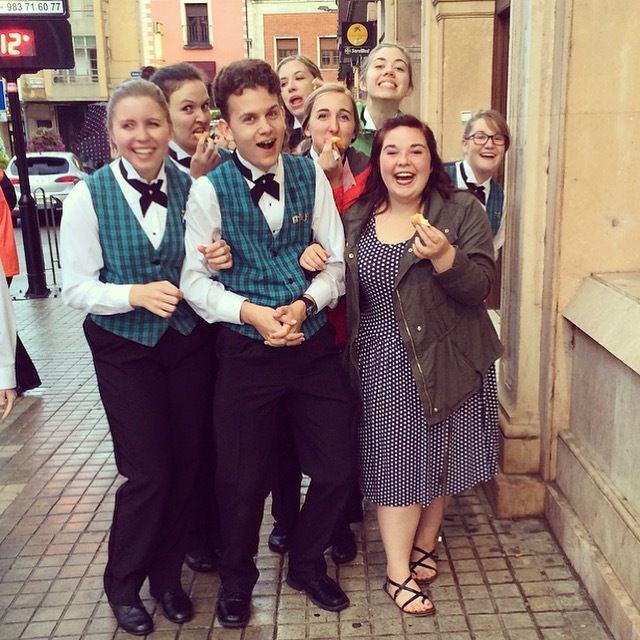What I Learned From the Fourth Row
There is this fear that every choir member has as they graduate from Spivey— an uncanny loathing for those teal seats that you’ve stared at for so long and will soon have to join in the audience. You hate them unconsciously, but as you leave from your last rehearsal you know. You know in the back of your mind that the next time you will see them will be when you’re looking for a seat at the Christmas concert, or if you’re lucky a Monday night when you sneak in to visit a practice. And maybe you sit with Mrs. Orre, but regardless you are still one with the chairs. You are still part of the audience.
And that’s what the problem is: being part of the audience. That lonely, gnawing feeling of being part of the crowd instead of part of the choir. Of sitting in the teal instead of wearing it.
As most of you know by now Spivey just got home from Spain, our ten day tour singing in cathedrals and convents, churches and monasteries and as some of you know a concussion prevented me from singing in the majority of our uniformed performances. So I’ve been there—fourth row, surrounded by strangers, in uncomfortable benches that weren’t teal but meant the same thing. I’ve cried the tears the alumni do, as I watched my concerts that I had left slowly ticking by. Counting down the chances I had to sing the songs, ticking off every note as it fled. I’ve smiled and clapped and loved from a distance, impulsively stood for a solo standing ovation that took over the room— because those were my people. They still are. And every song and note felt like a concert for me, only me (even though obviously it wasn’t) but the smiles were, the eyes darting from face to face each meeting my eyes, each smiling a little brighter when my eyes met theirs.
And that is what I learned from the fourth row in a cathedral in Spain: that the audience, that fourth row, is a place of belonging too. I think part of the fear of becoming an alumni is that you won’t belong to them anymore, but you always do.
I remember standing on stage smiling out into the audience to try and see who I could find. And I remember the feeling of elation when I found an alum that I knew, my smile growing until it felt like it would break my face. And part of graduating is the fear of being forgotten, that sooner or later there won’t be any eager faces looking for you in the audience. But in the fourth row with the eager eyes finding mine and the genuine comments of “I almost like having you in the audience better” and “I love seeing your facial expressions” it showed me that in December when I join the teal seats there will be eager eyes scanning the crowd for mine. And that there will still be people who run across the stage to hug me when I show up for a practice. That I may not wear the teal, but I still bleed it.
And so to my fellow alumni this is the best lesson I learned from the fourth row: it isn’t that bad. It’s a sort of crossing over, one that gives you a new appreciation, one where you sing the notes in your head and don’t have to worry about remembering the words. And it stinks, it eats at your heart a little (mostly when you sit next to Abarr and she gives you hugs that make you cry because this is your next to last concert and you can’t even participate) but it isn’t all that bad. There are little beauties to be found there. The fourth row, the teal seats— we do not wish them on anyone, but when your time comes, know that this too is a family. That your heart still beats to the same rhythm and your blood still runs teal, just this time the teal is in the seats and not the vests. This time you get to hear the beauty that has been created by your years of hard work and love. Those teal seats are where you see your legacy, and from the fourth row in that beautiful cathedral, I saw a glimpse of ours and it was spectacular.




/image%2F1627976%2F20180306%2Fob_89950a_img-2476.JPG)
/image%2F1627976%2F20171020%2Fob_493c7e_img-7735.JPG)
/image%2F1627976%2F20170528%2Fob_4098c9_img-4767.PNG)
/image%2F1627976%2F20170511%2Fob_d1e08d_16265381-1349859568398506-175653578331.jpg)
/image%2F1627976%2F20180306%2Fob_89950a_img-2476.JPG)
/image%2F1627976%2F20171020%2Fob_493c7e_img-7735.JPG)